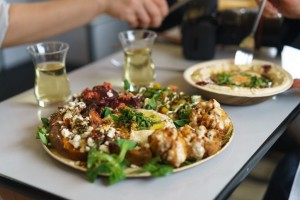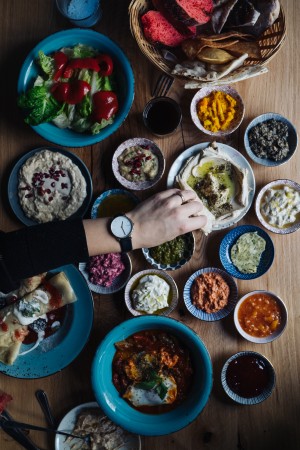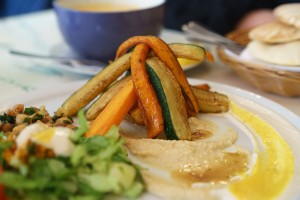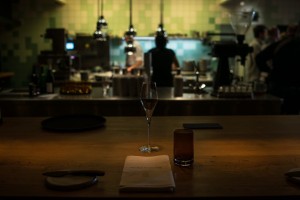It’s 11:30 in the morning when I speak to Oz, one half of the Kanaan founders, and he has to interrupt our conversation because there are already people knocking on the restaurant door waiting for him to open. “It’s a good thing” he says, laughing; “it means that people are finally starting to understand when hummus should be served!” He explains that across much of Israel, many of the city’s hummus shops are only open from 8-2pm; “it’s a dish designed to set you up for the day” he points out, “so if people in Berlin want it before 12pm, that’s great news.”
“[his] rejection marked the beginning of Kanaan’s pop-up kitchens and the proselytisation of all the stubborn mindsets they’d met with
Small breakthroughs such as this have punctuated much of Oz and his Kanaan co-founder Jalil's story since they first sought to introduce Israeli-Palestinian food into Germany. Having originally approached supermarkets with the view to set up a produce import business, the duo were rebuffed by all the major chains who doggedly insisted there wasn't any interest in such a market. It’s good news for us that the monoliths were so uncompromising on this point, because Oz and Jalil's rejection marked the beginning of Kanaan’s pop-up kitchens and their proselytisation of the stubborn mindsets they’d so far met with.
At the very first party Kanaan ever catered for, 1,000 people turned up instead of the expected 300. When Oz and Jalil took the next logical step and started to serve weekend brunches, tables were always fully-booked two months in advance. And when they extended their opening hours to include weekly lunches in the Hütte complex across the street, customers came knocking at dinner time complaining that the current opening hours weren’t long enough. Having now established themselves as one of Berlin’s most-loved restaurants with indefatigable speed, you won’t be surprised to hear the supermarkets called back - suddenly interested.
“its a multi-bridge approach to uniting both the Israeli and Palestinian kitchens, as well as the German and Middle Eastern eating sensibilities
One reason why Kanaan’s food has proved so popular is its multi-bridge approach to uniting both the Israeli and Palestinian kitchens as well as the German and Middle Eastern eating sensibilities. Take their Hummus Puffer dish for example: the hummus is made Palestinian-style, the salads are an Israeli offering, and Germany’s beloved Kartoffelpuffer (bound with tahini, instead of eggs and flour) makes the whole dish more accessible to a nation who have a (let’s call it intimate) love affair with the humble potato.
Elsewhere on the menu, seasonal German produce (such as pumpkin and red beetroot) is used instead of more traditional Middle Eastern vegetables as Oz and Jalil seek to make their menu as accessible, seasonal and sustainable as possible. That doesn’t mean compromises are made with the authenticity of the dishes though. The plates at Kanaan come loaded with Middle Eastern punctuation marks including tehina, pomegranate sauce, Amba (mango sauce), Za’atar (Arabian spices), Schug (spicy Yemenite pesto), and (of course) their trademark hummus.
“No matter which you order, you’ll have some sort of perfect cloud formation on your plate
If you’ve not had Kanaan’s hummus before, prepare an extra hole in your belt loop and dive in. It appears on the menu in a plethora of different forms – sometimes Palestinian-style, sometimes Iraqi-style – all of which are served with daily-changing, seasonal toppings. It's also the star of dishes such as Hamshuka, Masabacha, Sabich, Sambusak, and _Falafe_l. Regardless of which dish you order, you’ll be served some sort of perfect cloud formation on your plate (the Iraqi-style hummus is more like a Cumulonimbus; the Palestinian, more Stratus) scattered with chugs of olive oil and spices. Be warned that if you over-indulge on this stuff it will tranquilise you a good couple of hours, but it's risk worth taking.
Kanaan's tomato sauce (and the basis of their Shakshuka) is also not to be missed. It's the only tomato sauce recipe Oz's grandma ever mastered and, oh my, does it pack a punch with five different types of chilli peppers in the mix. Oz says the secret ingredient is a small Moroccan pepper which you can't find here in Berlin, it's added to an otherwise simple recipe and after a long cooking time the velvety sauce hits customers' plates.
“all the dishes on the menu work together and you’re actively encouraged to play with your food
The real magic of Kanaan is that all the dishes on the menu work together and you’re actively encouraged to play with your food. The aim isn’t to nibble at different sections on your plate, but to scoop everything into the middle and pile it onto your fork or bread. For the overly cautious, Kanaan even offer an insurance policy through which they’ll happily replace any dish which don’t get on with. Oz and Jalil want you to benefit from your time with them, so if that means something isn’t to your taste they want you to try something else instead.
It’s this openness, this lovingly-crafted Israeli/Palestinian curriculum, and this kind dedication to changing people's minds through 'showing' and not 'telling' which has seen Kanaan win over legions of fans these last couple of years. No wonder the supermarkets all want a piece of it now...
P.S. Leave room (a tricky undertaking) for desserts - we’re talking Rosewater Panna Cotta, (salty) Tahini Cheesecake, and Chocolate Eclairs filled with Arabic coffee cream.














